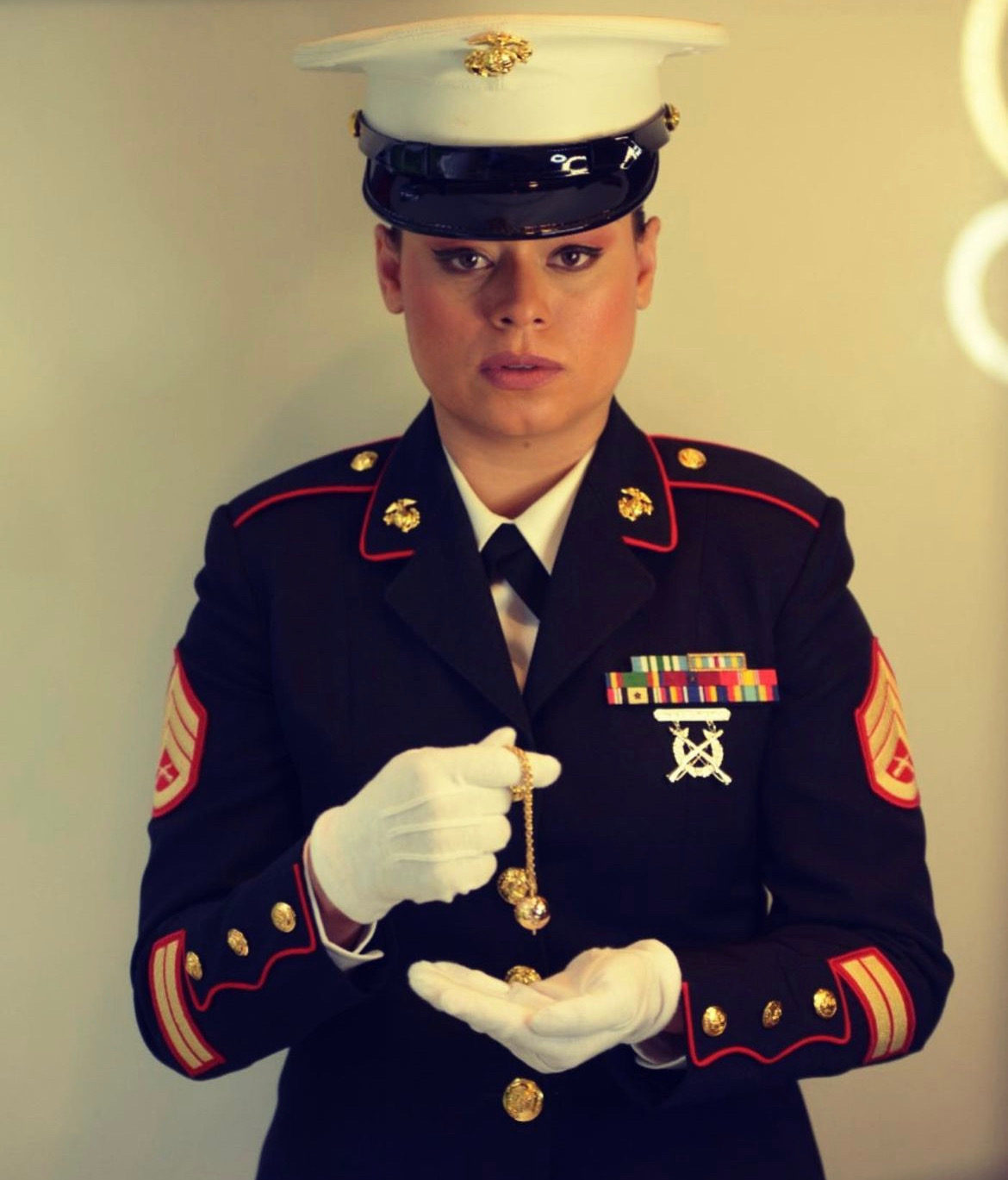On the second floor of the Lynnfield Public Library, Marine Corps veteran and federal investigator Alice Ward told her story for approximately two hours. The entire time, she sat with her feet pointed toward the nearest exit.
“It’s always safe — until it isn’t,” she remarked.
Ward served in Iraq for nearly a decade, doing intelligence work for the Marines. She then spent a short period of time as an FBI agent — a role she said “wasn’t a good fit” for her. Now, she’s a federal investigator for an organization she said she can not disclose.
“It’s investigation — sometimes we do private surveillance, sometimes we’re out talking to people just communicating and trying to build a case. That’s all I can say,” Ward said.
She’s also the founder of the Veterans of War Aid Foundation, a charity in which military-trained volunteers provide around-the-clock security for large-scale events to raise money for veterans suffering from post-traumatic stress disorder (PTSD).
“Twenty-two veterans kill themselves every day, and I’m fundraising for my friends. In 2014, I buried seven of my friends, and I realized I didn’t want to put people in their coffins anymore. I wanted to help them out,” she said.
Ward moved to Massachusetts from Brazil at the age of 16. She dreamed of going to Harvard University, but, disoriented by a new culture, language, and country, ended up working as a house cleaner. She sent the earnings to her family in Brazil.
Her high-school guidance counselor, a Marine who she refers to as her “American dad,” took time after school to teach Ward how to plan for her future, budget her earnings, and navigate American culture.
“He became my mentor. He’s an American citizen, he was born here, and he was a Marine. So he talked about the Marine Corps, and how much the Marine Corps saved his life, and the importance of learning English and paying your taxes and assimilating to American culture,” Ward said.
Ward’s guidance counselor, who asked that his name be omitted from this article, legally adopted her, and guided her to graduation with a 4.0 grade-point average.
In 2006, Ward was accepted to Harvard through a transfer from Bunker Hill Community College. As an international student, she couldn’t afford the tuition, so she dropped out to join the Marine Corps.
“My dad said, ‘This is going to be the best route for you. In the military, you’re going to learn what service means.’” she said. “It was a few years after Sept. 11, so that encouraged me to take a stand in protecting the country.”
Thirteen weeks of Marine Corps basic training were extremely challenging for Ward. She was no longer allowed to refer to herself in the first person, and faced hard discipline for any slip-ups.
“If you make a mistake, or you lose your bearings, or you fall outside of what the basic training protocol looks like, you’re getting destroyed,” she said.
With the ability to speak Portuguese, French, Italian, Spanish, and English, Ward’s language skills caught the attention of her superior officers. One day, Ward was pulled from rifle training to take a series of language tests, including Defense Language Aptitude Battery (DLAB) testing to assess her ability to quickly learn made-up crypto languages.
Ward passed those tests with flying colors, and graduated basic training receiving the Molly Marine Award, a high honor. After serving for three years in Hawaii, Ward was deployed to Iraq in 2009, where she was stationed at Al-Faw Palace in Baghdad.
There, Ward took a potentially career-ending risk to help an Iraqi woman who said she got pregnant after being sexually assaulted by an American soldier.
“She ended up having a very negative interaction with an Army soldier which resulted in a pregnancy — that’s an honor kill, so I had to go against the system to protect her. I had to go against my own chain of command,” Ward said. “I didn’t come to combat to kill people. I came into combat to save people.”
Ward, a corporal, fought for months with high-ranking officers to ensure the woman was able to leave Iraq safely. She went over the chain of command and eventually got approval from a Judge Advocate General’s Corps officer to transport the nine-months pregnant woman on a midnight medevac flight to the United States.
“We did a secret operation. We put her inside this big black Escalade. My chain of command had no idea about it, and she was nine-months pregnant,” Ward said. “It wasn’t about the uniform anymore. It was about having integrity.”
Ward’s relationship with the Iraqi woman turned into a lifelong friendship. The Iraqi woman enlisted in the U.S. Army, and when the Islamic State group invaded Iraq in 2014, she and Ward discussed ways to extract her from Iraq. Last summer, Ward said, the woman’s sister was burned alive in an honor killing.
“The summer of last year, I got a phone call from her mom saying that her sister got burned to death. They set her on fire,” Ward said.
The tragic news, which came almost 11 years after Ward’s departure from Iraq, exacerbated her PTSD symptoms tremendously. She said that at that moment, she realized how much danger she was in during her tour in Iraq.
The Veterans of War Aid Foundation, Ward said, is her way of trying to help veterans with all kinds of wounds, visible or invisible. The program focuses on helping veterans transition from combat roles back to civilian life.
“When you’re living in a full-on war, you don’t really grasp it because you’re surviving — your instincts are coming in,” Ward said. “This isn’t a combat story of me picking up an M16 and going to kill terrorists. This is a real danger, but very covert. I don’t get a Purple Heart for this kind of damage. I can’t show the military my wound.”

